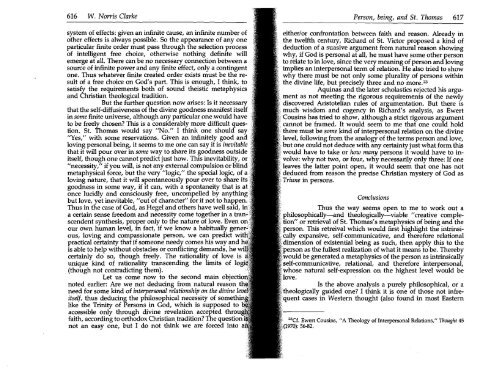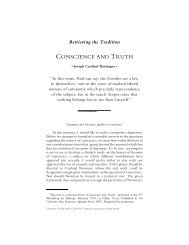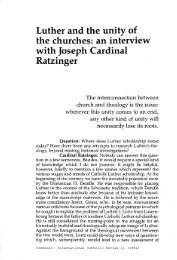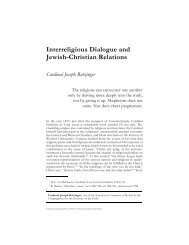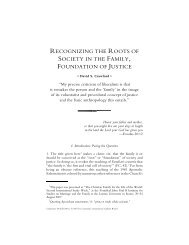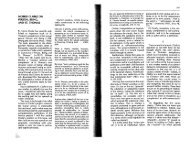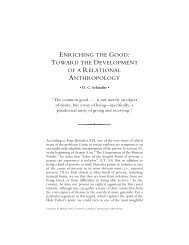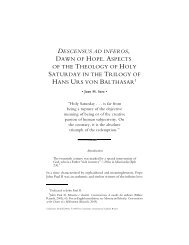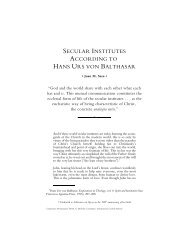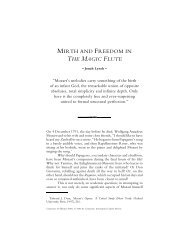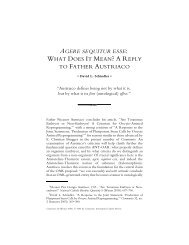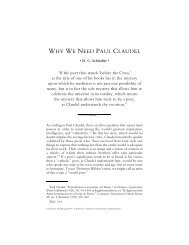W. Norris Clarke. Person, Being, and St. Thomas. Communio 19 ...
W. Norris Clarke. Person, Being, and St. Thomas. Communio 19 ...
W. Norris Clarke. Person, Being, and St. Thomas. Communio 19 ...
Create successful ePaper yourself
Turn your PDF publications into a flip-book with our unique Google optimized e-Paper software.
616 W. <strong>Norris</strong> <strong>Clarke</strong> . <strong>Person</strong>, being, <strong>and</strong> <strong>St</strong>. <strong>Thomas</strong> 617<br />
system of effects: given an infinite cause, an infinite number of eitherlor confrontation between faith <strong>and</strong> reason. Already in<br />
other effects is always possible. So the appearance of any one the twelfth century, Richard of <strong>St</strong>. Victor proposed a kind of<br />
particular finite order must pass through the selec deduction of a suasive argument from natural reason showing<br />
of intelligent free choice, otherwise nothing why, if God is personal at all, he must have some other person<br />
emerge at all. There can be no necessary connection between a : to relate to in love, since the very meaning of person <strong>and</strong> loving<br />
source of infinite power <strong>and</strong> any finite effect, only a contingent implies an interpersonal term of relation. He also tried to show<br />
one. Thus whatever finite created order exists must be the re- why there must be not only some plurality of persons within<br />
sult of a free choice on God's part. This is enough, I think, to the. divine life, but precisely three <strong>and</strong> no m0re.~3<br />
satisfy the requirements both of sound theistic Aquinas <strong>and</strong> the later scholastics rejected his argu<strong>and</strong><br />
Christian theological tradition. ent as not meeting the rigorous requirements of the newly<br />
But the further question now arises: I scovered Aristotelian rules of argumentation. But there is<br />
that the self-diffusiveness of the divine goodness uch. wisdom. <strong>and</strong> cogency in Richard's analysis, as Ewert<br />
in some finite universe, although any particular o as tried to show, although a strict rigorous argument<br />
to be freely chosen? This is a considerably mo framed. It would seem to me that one could hold<br />
tion. <strong>St</strong>. <strong>Thomas</strong> would say "No." I think e kind of interpersonal relation on the divine<br />
"Yes," with some reservations. Given an i analogy of the terms person <strong>and</strong> love,<br />
loving personal being, it seems to me olie c ith any certainty just what form this<br />
that it will pour over in some w many persons it ,would have to initself,<br />
though one cannot pre r, why necessarily only three: If one<br />
"necessity," if you will, is no int open, it would seem that one has not<br />
metaphysical force, but the ve ced from reason the precise Christian mystery of God as<br />
loving nature, that it will spo<br />
goodness in some way, if it can<br />
once lucidly <strong>and</strong> consciously fr<br />
Conclusions<br />
but love, yet ineGtable, "out of<br />
Thus in the case of God, as Hegel <strong>and</strong> others have w Thus the way seems open to me to work out a<br />
a certain sense freedom <strong>and</strong> necessity come togethe theologically-viable "creative comple-<br />
scendent synthesis, proper only to the nature of love. Even on' <strong>St</strong>. <strong>Thomas</strong>'s metaphysics of being <strong>and</strong> the<br />
our own human level, in fact, if we know a habitually gener-:i a1 which would first highlight the intrinsi-<br />
ous, loving <strong>and</strong> compassionate person, we can predict with; self-communicative, <strong>and</strong> therefore relational<br />
practical certainty that if someone nee tial being as such, then apply this to the<br />
is able to help without obstacles or co alization of what it means to be. Thereby<br />
certainly do so, though freely. Th a metaphysics of the person as intrinsically<br />
unique kind of rationality transce relational, <strong>and</strong> therefore interpersonal,<br />
(though not contradicting them). ression on the highest level would be<br />
Let us come now<br />
noted earlier: Are we not deducin Is the above analysis a purely philosophical, or a<br />
need for some kind of interpersonal eologically guided one? I think it is one of those not infre-<br />
itself, thus deducing the philosop uent cases in Western thought (also found in most Eastern<br />
like the Trinity of <strong>Person</strong>s in G<br />
accessible only through divine<br />
faith, according to orthodox Chri eology of Interpersonal Relations," Thought 45<br />
not an easy one, but I do not


